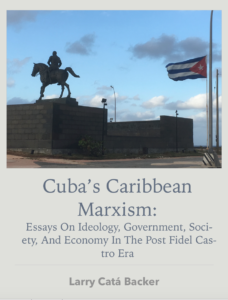ISBN: 978-1-949943-00-9 (pbk) • e-ISBN 978-1-949943-01-6 (ebk)).
About this book:
This book is about ideology in the contemporary world. Ideology serves as the foundation that makes it possible for a political community to develop principles through which it can organize itself by reference to a core baseline against which to understand the world around. This book is also more particularly about Cuba. Cuba serves as an ongoing living experiment in the possibilities of molding individuals and the society along the lines suggested by application of a quite explicit set of grounding principles that form an ideology. Fidelity to ideology within a national context makes it possible to create and operate government, society, politics, and economics that are “good” and against which reform can be assessed and applied. The essays that comprise the twelve chapters of this book are drawn from a decade and more of thinking about Cuban ideology and its application in the wake of the passing of Fidel Castro, the charismatic founder of what these essays identify as Caribbean Marxism. The first 7 chapters develop the conceptual framework for understanding Caribbean Marxism as a theory and the challenges that theory poses in the face of reform necessitated by changes in historical condition. Chapters 8 through 12 focus on the concrete manifestation of these abstract structures in several key areas–economic organization of the private sector, trade and investment, and lastly the project of constitutional reform.
_________
Ordering Information
 Order here Order Here Order here
Order here Order Here Order here
__________
Contents
Dedication iii
Acknowledgements iv
Introduction
Chapter 1: Pearl of the Caribbean and Mother of Marxism
1.1 Cuban Transformations Since European Discovery
1.2 Organization of the Chapters that Follow
1.3 References
Chapter 2: The Centrality of Ideology to Caribbean Marxism
2.1 Ideological Paths Toward Socialist Modernization: China Versus Cuba
2.2 The Consequences of Ideology on Economic Reform: Occupational Licensing, Cooperatives and Ley 118
2.3 Ideology and Transition—Cuba at a Crossroads
2.4 Conclusion
2.5 References
Chapter 3: Cuban Leninism as Praetorian Marxism
3.1 Cuba in a Wider Marxist-Leninist Context
3.2 The Comparative View From North Korea
3.3 Conclusion
3.4 End Notes
3.5 References
Chapter 4: “Order, Discipline and Exigency:” Cuba’s 6th Party Congress, the Lineamientos, and Structural Change
4.1 The Lineamientos
4.2 Moving Forward
4.3 Conclusion
4.4 End Notes
4.5 References
Chapter 5: The Current State of Political Ideology: Caribbean Marxism From Lineamintos to (Re)Conceptualization of the Political and economic Model
5.1 The Process of the 7th PCC Congress: A Step Back From 6th PCC Congress Socialist Democracy?
5.2 The Substance of the 7th PCC Congress: ‘Reform and Opening Up’ or a Failure to Adjust to a New Era?
5.3 Conclusions and Implications
5.4 End Notes
5.5 References
Chapter 6: The Ideology of Central Planning in the Economic and Social Development Plan 2030
6.1 The Plan Nacional de Desarrollo Económico y Social Hasta 2030 (National Economic and Social Development Plan 2030) (PNDES)
6.2 From Theory to Decision-Making Structures: How PNDES Informs Approaches to Development Without Market Mechanisms
6.3 Conclusion
6.4 End Notes
6.5 References
Chapter 7: Sovereign Finance, Odious Debt Doctrine, and Reform
7.1 Traditional Odious Debt Doctrine
7.2 From a Focus on the Debtor to a Focus on the Lender
7.3 Application to the Situation in Cuba
7.4 The Silver Lining
7.5 Conclusion
7.6 References
Chapter 8: The Role of Labor Cooperatives in Cuban Reform
8.1 Economic Organizations in Cuba—Limiting Power of Individuals to Aggregate Capital or Labor Absent State Oversight
8.2 The Cooperative in Cuba—An Increasingly Flexible Post-Revolutionary Device
8.3 The Cooperative in Global Context—Theory and Engagement in Cuba and the ALBA Zone
8.4 Conclusion
8.5 References
Chapter 9: The Challenges of Regulatory Reform: The Example of Labor Cooperative Regulations
9.1 The Labor Cooperative Regulations
9.2 The December 2012 Regulatory Framework
9.3 The Problem of Labor and the Construction of Socialism in Cuba
9.4 The Problem of Labor Under the Regime of Capital
9.5 Conclusion
9.6 End Notes
9.7 References
Chapter 10: Globalization and the Caribbean Marxist Multinational: Cuba and Regional Trade
10.1 The Grannacional—As Concept, Project, and Enterprise
10.2 From Theory to Practice: Just Commerce, Grannacional Organization, and the Misiones
10.3 Points of Conflict and Intersection Between ALBA ‘Just Commerce’ Principles and International Human Rights Standards
10.4 Conclusion
10.5 End Notes
10.6 Conclusion
Chapter 11: Reform and Global Corporate Social Responsibility: Inbound Investment, and Outbound Economic Activity
11.1 The Emerging Structures of Global Human Rights
11.2 Cuban Investment Structure
11.3 When Global Regulation Initiatives Collide With Cuban Practice
11.4 Flash Points and Conflict Zines
11.5 Conclusion
11.6 References
Chapter 12: From Ideology to Cuban Constitution Reform
12.1 A New Constitution for Cuba: Principles and Reform
12.2 The Constitution as Nkisi: Hope, Desire, and Distrust in Cuban Constitutional Reform
12.3 Popular Referendum and Popular Consultation: Socialist Democracy in Caribbean Marxism
12.4 Conclusion
12.5 References
Afterward
About the Book
About the Author
Other Books by the Author
⇒Back to Little Sir Press Homepage⇐





